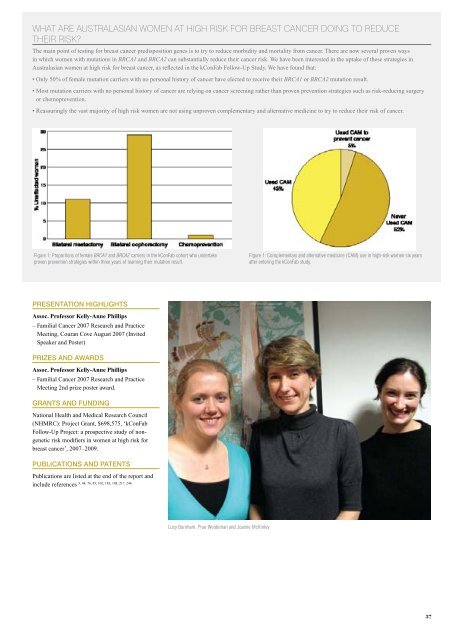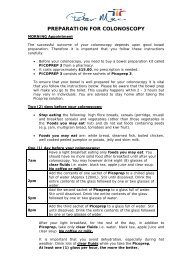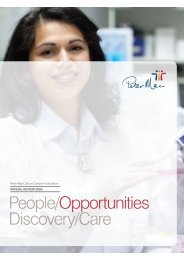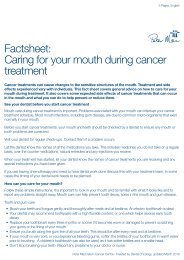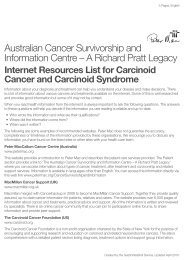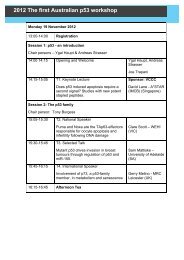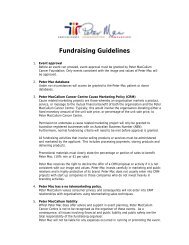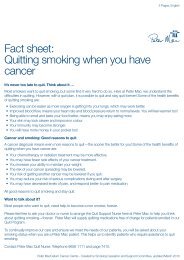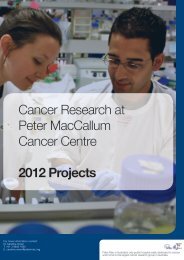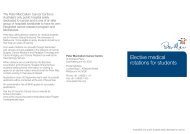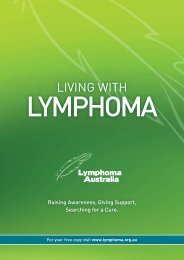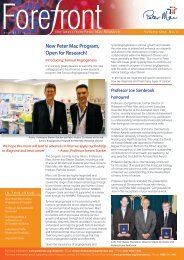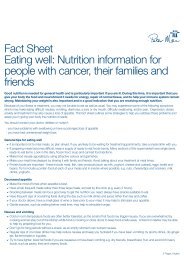RESEARCH REPORT - Peter MacCallum Cancer Centre
RESEARCH REPORT - Peter MacCallum Cancer Centre
RESEARCH REPORT - Peter MacCallum Cancer Centre
Create successful ePaper yourself
Turn your PDF publications into a flip-book with our unique Google optimized e-Paper software.
what are austraLasian woMen at hiGh risk for Breast CanCer DoinG to reDuCe<br />
their risk?<br />
The main point of testing for breast cancer predisposition genes is to try to reduce morbidity and mortality from cancer. There are now several proven ways<br />
in which women with mutations in BRCA1 and BRCA2 can substantially reduce their cancer risk. We have been interested in the uptake of these strategies in<br />
Australasian women at high risk for breast cancer, as reflected in the kConFab Follow-Up Study. We have found that:<br />
• Only 50% of female mutation carriers with no personal history of cancer have elected to receive their BRCA1 or BRCA2 mutation result.<br />
• Most mutation carriers with no personal history of cancer are relying on cancer screening rather than proven prevention strategies such as risk-reducing surgery<br />
or chemoprevention.<br />
• Reassuringly the vast majority of high risk women are not using unproven complementary and alternative medicine to try to reduce their risk of cancer.<br />
Figure 1: Proportions of female BRCA1 and BRCA2 carriers in the kConFab cohort who undertake<br />
proven prevention strategies within three years of learning their mutation result.<br />
presentation highlights<br />
Assoc. Professor Kelly-Anne Phillips<br />
– Familial <strong>Cancer</strong> 2007 Research and Practice<br />
Meeting, Couran Cove August 2007 (Invited<br />
Speaker and Poster)<br />
prizes anD awarDs<br />
Assoc. Professor Kelly-Anne Phillips<br />
– Familial <strong>Cancer</strong> 2007 Research and Practice<br />
Meeting 2nd prize poster award.<br />
grants anD funDing<br />
National Health and Medical Research Council<br />
(NHMRC): Project Grant, $698,575, ‘kConFab<br />
Follow-Up Project: a prospective study of nongenetic<br />
risk modifiers in women at high risk for<br />
breast cancer’, 2007–2009.<br />
publications anD patents<br />
Publications are listed at the end of the report and<br />
5, 44, 76, 85, 102, 183, 188, 217, 244.<br />
include references<br />
Lucy Burnham, Prue Weideman and Joanne McKinley<br />
Figure 1: Complementary and alternative medicine (CAM) use in high-risk women six years<br />
after entering the kConFab study.<br />
37


